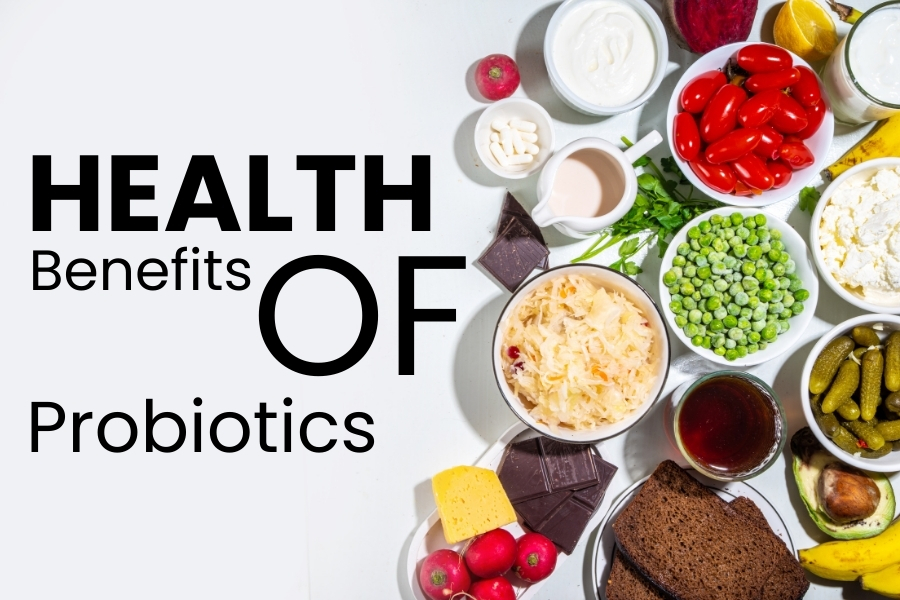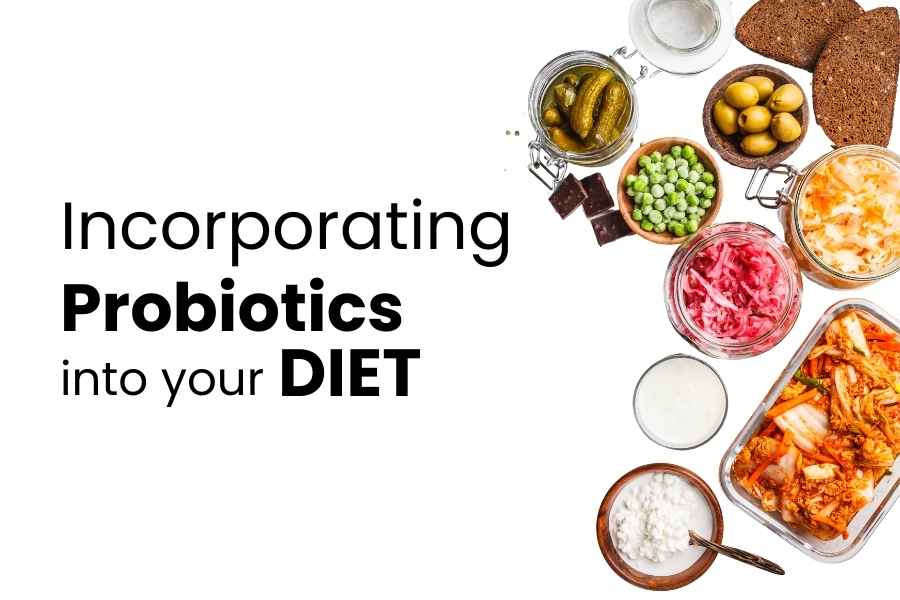You must have heard of probiotics. But do you know exactly what these microscopic wonders can do for your overall health and well-being? If not, then let us tell you how beneficial these probiotics are.
From boosting your immune system to regulating digestion, the advantages of adding probiotics to your diet are nothing short of remarkable.
In this blog, we will talk about probiotics, exploring the methods in which they can transform your relationship with food and unlock a more vibrant, healthier you. Let's begin!
What Are Probiotics?
The world of probiotics can seem overwhelming, but understanding what they are and how they work is crucial to unlocking their benefits.
Probiotics are live microorganisms, typically bacteria or yeast that are similar to the beneficial microorganisms found in your body. These microorganisms play a major role in maintaining a healthy gut microbiome, which is important for better health.
Types of Probiotics
Identification of the different types of probiotics is crucial to understanding their unique benefits. There are numerous strains, each with its distinct characteristics and advantages.
- Lactobacillus acidophilus
- Bifidobacterium bifidum
- Streptococcus thermophilus
- Bacillus coagulans
- Escherichia coli
After researching the various types of probiotics, you'll realize that each strain has its unique benefits & can be used to target multiple health concerns.
| Probiotic Strain | Benefits |
| Lactobacillus acidophilus | Supports digestion, boosts immune system |
| Bifidobacterium bifidum | Enhances nutrient absorption, supports healthy gut bacteria |
| Streptococcus thermophilus | Aids in lactose intolerance, supports immune system |
| Bacillus coagulans | Supports gut health, reduces symptoms of IBS |
Now that you're aware of probiotics let's dive deeper into the science behind how they work.
How Probiotics Work in the Gut
Probiotic microorganisms colonize your gut, where they interact with your immune system, produce vitamins, and regulate the digestion of food. They also help to crowd out harmful bacteria, reducing inflammation & promoting a healthy balance of gut flora.
The Microbiome and Its Importance
The human body is composed of trillions of microorganisms that live within and on your body, influencing everything from your mood to your metabolism.
A healthy microbiome is imperative for proper immune function, nutrient absorption, and even the production of certain neurotransmitters. When your microbiome is out of balance, you may experience symptoms like bloating, fatigue, and digestive issues.
By adding probiotics to your diet plan, you can help restore balance to your microbiome and reap the many benefits that come with it.
Health Benefits of Probiotics

Some of the most significant advantages of incorporating probiotics into your diet are the numerous health benefits they provide. From digestive health to immune system function and even mental well-being, probiotics can have a profound impact on your overall health.
Digestive Health and Regularity
Aiding in the fast breakdown of food & absorption of nutrients, probiotics help maintain a healthy gut microbiome. This leads to regular bowel movements, reduces symptoms of irritable bowel syndrome (IBS), and even alleviates bloating and discomfort.
Boosting the Immune System
Probiotics play a lead role in supporting your immune system, helping to fight harmful pathogens and diseases. By promoting a balanced gut microbiome, probiotics enable your immune system to function at its best.
Plus, research has shown that probiotics can increase the production of antibodies, activate immune cells, and even reduce inflammation, all of which contribute to a stronger immune response.
Mental Health and Mood Enhancement
Mood-boosting neurotransmitters like serotonin and dopamine are produced in the gut, making probiotics an important component of mental health. Maintaining a healthy gut can help regulate your mood & reduce symptoms of anxiety and depression.
By adding probiotics to your regular diet, you can experience improved mental clarity, reduced stress, and a more balanced mood.
Probiotics and Weight Management
All of us strive to maintain a healthy weight, and probiotics can play a significant role in achieving this goal. Research has shown that probiotics can help with weight management by influencing your metabolism, appetite, and body composition.
How Probiotics Affect Metabolism
Manipulating your metabolic rate can be a game-changer when it comes to weight loss. Probiotics have been found to increase metabolism, helping your body burn fat more efficiently. This means that you can shed those extra pounds more easily and maintain your weight loss over time.
Probiotics and Appetite Regulation
To better understand how probiotics affect weight management, let's take a closer look at their impact on appetite regulation. Probiotics have been shown to reduce hunger and increase feelings of fullness, making it easier for you to stick to your diet & avoid overeating.
This is because probiotics produce certain hormones that signal to your brain that you're full, reducing your desire to snack or overindulge. Additionally, probiotics can also help slow down gastric emptying, keeping you feeling fuller for longer. By regulating your appetite, probiotics can help you make healthier food choices & maintain a healthy weight.
Food Sources of Probiotics
Many of you may be wondering where to find probiotics in your diet. Fortunately, several food sources are rich in these beneficial bacteria.
Fermented Foods and Drinks
Anyone looking to incorporate probiotics into their diet should start with fermented foods and drinks. These include sauerkraut, kimchi, kefir, kombucha, and yogurt. These foods contain live cultures that help to populate your gut with beneficial bacteria.
Probiotic-Rich Dairy Products
Probiotic-rich dairy products are an excellent way to get your daily dose of beneficial bacteria. You can find probiotics in various fermented dairy products like yogurt, cheese, and milk.
Food manufacturers have also started to incorporate probiotics into their dairy products, making it easier for you to get the benefits of probiotics in your diet. Look for products that have "live and active cultures" or "probiotics" on the label to ensure you're getting the real deal.
Probiotic Supplements and Pills
An easy way to ensure you're getting enough probiotics in your diet is to take a supplement or pill. These come in various forms, including capsules, tablets, and powders.
Another benefit of probiotic supplements is that they often have a longer shelf life than fermented foods and drinks, making them a convenient option for those with busy lifestyles. Just be sure to choose a good brand & follow the recommended dose to reap the benefits. You can select Mega sporebiotic, an effective probiotic supplement to maintain healthy gut barrier function.
Now, this can be your question of how to take these probiotics. No more wonder; let us tell you how!
Incorporating Probiotics into Your Diet

To reap the benefits of probiotics, it's important to incorporate them into your daily diet in a way that's easy and sustainable for you.
Tips for Adding Probiotics to Your Meals
You can easily add probiotic-rich foods to your meals to give your diet a boost. Try adding fermented foods like kimchi, sauerkraut, or kefir to your breakfast, lunch, or dinner. You can also take a probiotic supplement or add probiotic powder to your smoothies or oatmeal.
- Start with small amounts and then gradually increase your intake to allow your gut microbiome to adjust.
- Experiment with different types of foods to find what you enjoy most.
- This will help you stick to your probiotic-rich diet and make it a sustainable part of your lifestyle.
Creating a Probiotic-Rich Meal Plan
Your meal plan should include a variety of probiotic-rich foods to ensure you're getting a diverse range of beneficial bacteria.
Creating a probiotic-rich meal plan involves more than just adding fermented foods to your diet. It requires a thoughtful approach to planning your meals to ensure you're getting the right balance of nutrients and probiotics.
Consider consulting with a nutritionist or doctor to develop a customized diet plan for you to cater for your needs.
Probiotic-Friendly Cooking Methods
Meals cooked using gentle heat and minimal processing help preserve the delicate balance of probiotics in your food.
Probiotics are sensitive to heat, so it's important to cook your meals using methods that preserve their potency. Avoid high-heat cooking methods like frying or boiling and instead opt for gentle cooking methods like steaming or sautéing.
This will help ensure that the probiotics in your food remain intact and can provide the maximum benefits to your gut health.
Conclusion
Conclusively, incorporating probiotics into your diet can have a transformative impact on your overall well-being. By adding these beneficial microorganisms to your daily routine, you can experience improved digestion, a boosted immune system, and even enhanced mental clarity. Also, you can select different supplements to get enough probiotics. As you initiate this journey to harness the power of probiotics, remember that every bite is an opportunity to nourish your body and cultivate a healthier, happier you.
FAQs
Q: What are probiotics, and how do they benefit my diet?
Probiotics are live microorganisms that, when consumed in adequate amounts, provide numerous health benefits. They are beneficial bacteria that can be found in fermented foods like kefir, yogurt, sauerkraut, and kimchi. Probiotics can help regulate digestion, boost the immune system, and even support mental health.
Q: How do probiotics support gut health?
Probiotics play a crucial role in maintaining a healthy gut microbiome. They help to crowd out harmful bacteria and other microorganisms that can cause digestive issues, such as bloating, cramps, and diarrhea. Probiotics also aid in the breakdown of food, absorption of nutrients, and production of vitamins. A healthy gut has been linked to various benefits, including improved digestion, boosted immunity, and even mental clarity.
Q: Can probiotics help with weight management?
Yes, probiotics can play a role in weight management. Research has shown that an imbalance of gut bacteria, also known as dysbiosis, is common in individuals who are overweight or obese. Probiotics balance the bacteria in the gut, which can lead to improved metabolism, reduced inflammation, and increased feelings of fullness and satisfaction.
Q. How do I select the right probiotic supplement?
When choosing a probiotic supplement, it's vital to consider several factors. Look for a supplement that has multiple spores of bacteria, as different spores provide different benefits. Ensure the supplement has a sufficient number of colony-forming units (CFU), typically in the billions. Megaspore Biotic has 4 billion CFU and 5 bacillus spores, which makes it an excellent product. Check the expiration date & storage instructions, as probiotics are live organisms that require proper storage to remain effective.
Q: Are probiotics considered safe for everyone?
Probiotics are generally safe for all, including children, pregnant women, and the elderly. However, certain individuals may need to exercise caution or consult with a healthcare professional before taking probiotics. These include individuals with compromised immune systems, those who have undergone recent surgery, or those with open wounds. Additionally, individuals with certain medical conditions, such as ulcerative colitis, may need to choose specific strains of probiotics or consult with a professional to ensure safe and effective use.










